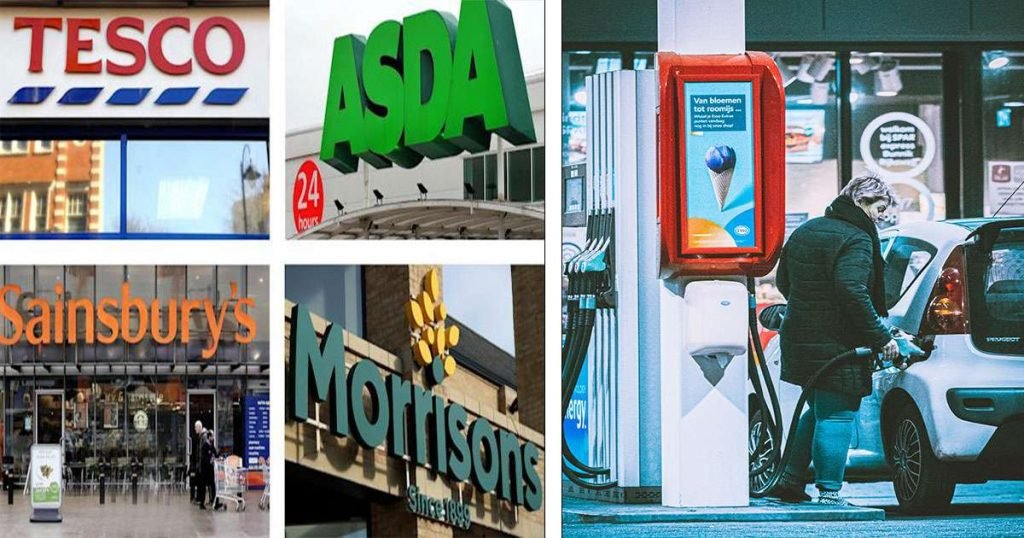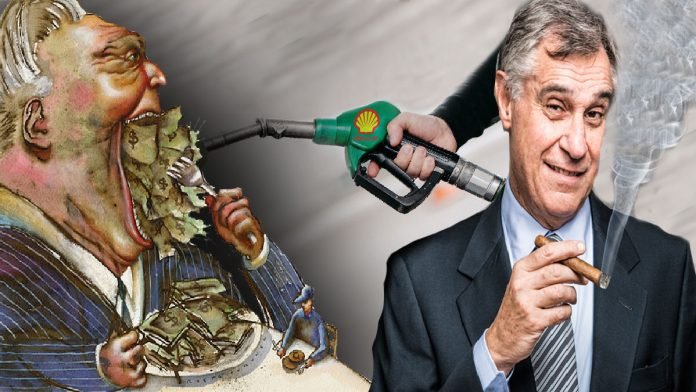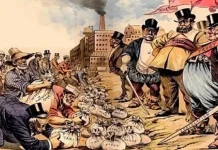Unleaded Greed: Supermarkets’ Shameful Tactics to Maximize Fuel Profits
Supermarkets have been charging drivers filling up at the pumps 6p per litre more than they should have been last year. Throughout 2022 it is estimated that motorists were charged an extra £900 million on the forecourt in 2022, according to the Competitions and Markets Authority.
The rapacious greed of the supermarket chains, which have long exploited their captive customers with exorbitant prices for basic goods, was exposed once again by a scathing investigation that found how they fleeced motorists who had paid nearly £1bn too much in fuel costs last year.
While millions of hard-working families struggled to make ends meet amid the soaring costs of living, these corporate behemoths shamelessly profited from their monopoly over the petrol pumps, charging far more than the market value for a litre of fuel. It is high time that the government intervened to curb this outrageous racket and ensure fair competition and consumer protection in the fuel industry.
These supermarket fuel retailers have been fleecing motorists for years, pocketing an extra 6p per litre of petrol or diesel sold between 2019 and 2022, according to the damning report by the Competition and Markets Authority (CMA). This amounts to a staggering £2.70 to £3.90 overcharge for every tank of fuel that the drivers have been forced to pay at the pump. Rishi Sunak’s government, sensing the public outrage, has pledged to end this daylight robbery and stop treating the motorists as “cash cows” for the greedy oil industry.
Keeping prices too high to “increase margins” meant motorists paid around £900m too much at the fuel forecourts run by Asda, Tesco, Sainsbury’s and Morrisons in 2022, the CMA stated.
While the regulator claim to have found no evidence of “cartel behaviour”, the government accused the supermarkets of “using motorists as cash cows” by “jacking up prices” but refusing to pass on savings.
The Pumpwatch Solution: Unmasking Supermarket Fuel Price Manipulation

Downing Street’s solution is to introduce new legislation that would ostensibly compel fuel retailers to disclose their up-to-date diesel and petrol prices to third parties. This, they claim, would facilitate the development of price comparison apps and websites, allegedly providing drivers with the ability to seek out the cheapest fuel options in their vicinity.
It sounds very much like consumers will soon be travelling way out of their way spending a pound to save a penny, following an app for the cheapest fuel.
Not only that it seems, No 10 is not content with merely placing this responsibility on retailers. They have also declared their intention to grant new powers to a public organisation, supposedly to “closely monitor” pump prices and promptly “alert” ministers if they deem further intervention necessary. As part of their grand plan, they have even announced an upcoming consultation on these proposed measures in the autumn.
To suggest that the Competition and Markets Authority (CMA) is not mincing words when recommending the introduction of legislation for a ‘pump watch’ scheme is quite the amusing notion. Oh, how delightful it is to imagine a world where local fuel prices are conveniently displayed on sat navs and mobile apps, empowering drivers with the ability to effortlessly compare and locate the most favourable prices nearby. The promise of increased competition, leading to the natural decline of prices, sounds almost too good to be true. Alas, in the face of such blatant thievery, these hollow assurances ring as empty as the pockets of those unfortunate motorists.
The truth is you cannot help but marvel at the dexterity of those in power, conjuring up initiatives that offer the illusion of empowerment while conveniently sidestepping the root causes of the issue and outsourcing to a third party. The ‘pump watch’ scheme may appear as a knight in shining armour, but beneath the gleaming facade lies the heart of a jester, jesting at the plight of the weary motorists.
After all have we not been shouting from the rooftops for the last two decades ‘Retailers are ripping us off at the pump!’ for the pleasure of exercising our vocals. We’ve heard such promises before, and they often turn out to be nothing more than hollow rhetoric designed to appease the masses. The notion that the government will suddenly champion the cause of consumers and actively regulate fuel prices, after years of neglect and inaction, does nothing but raise a few eyebrows.
It’s very much worth considering the motivation behind this sudden enthusiasm for transparency on fuel prices. Could it be that Downing Street is seeking to deflect attention from its own failings and distract the public from more pressing matters? After all, it is no secret that the government is currently grappling with numerous challenges, ranging from economic woes to political scandals. What better way to divert attention than by promising a noble crusade against inflated fuel prices?
Furthermore, we must not overlook the practical challenges of implementing such measures. Creating price comparison apps and websites sounds appealing in theory, but in practice, it may prove to be a herculean task.
The fuel market is complex, with prices fluctuating frequently and varying across regions. How can the government ensure that these platforms provide accurate and reliable information? And even if they manage to overcome these obstacles, what guarantee do we have that consumers will genuinely benefit from this information? Will it truly lead to a significant reduction in prices, or will it be yet another exercise in futility? It’s just a go-compare website that motorists could well do without.
As for the proposed “closely monitoring” and “alerting” mechanisms, we must approach them with a healthy dose of scepticism.
What motorists urgently require is not the empty promises of politicians or the hollow apologies of Robber Barons, but a vigilant and empowered watchdog that can impose fines so severe that they would wipe out the obscene profits of these plunderers.
However, some organisations with a little less scepticism have seen this as a breakthrough.
The RAC said it was “extremely pleased” that the government was taking action, while the AA said the promised changes were “better late than never” – arguing that it was “blindingly obvious” that supermarkets had been charging too much.
The AA stated drivers were “rightly convinced” for more than a decade that pump prices “shoot up” when costs rise but fall “much more slowly” when costs decline.
AA spokesperson Luke Bosdet said: “Sadly, it has taken more than 15 years for a government and competition watchdog to recognise this and do something about it. However, action that is better late than never is greatly appreciated by motorists across the UK.”
But for many the big question is, why governments have allowed this practice to continue for so long?
Support Independent Journalism Today
Our unwavering dedication is to provide you with unbiased news, diverse perspectives, and insightful opinions. We're on a mission to ensure that those in positions of power are held accountable for their actions, but we can't do it alone. Labour Heartlands is primarily funded by me, Paul Knaggs, and by the generous contributions of readers like you. Your donations keep us going and help us uphold the principles of independent journalism. Join us in our quest for truth, transparency, and accountability – donate today and be a part of our mission!
Like everyone else, we're facing challenges, and we need your help to stay online and continue providing crucial journalism. Every contribution, no matter how small, goes a long way in helping us thrive. By becoming one of our donors, you become a vital part of our mission to uncover the truth and uphold the values of democracy.
While we maintain our independence from political affiliations, we stand united against corruption, injustice, and the erosion of free speech, truth, and democracy. We believe in the power of accurate information in a democracy, and we consider facts non-negotiable.
Your support, no matter the amount, can make a significant impact. Together, we can make a difference and continue our journey toward a more informed and just society.
Thank you for supporting Labour Heartlands












